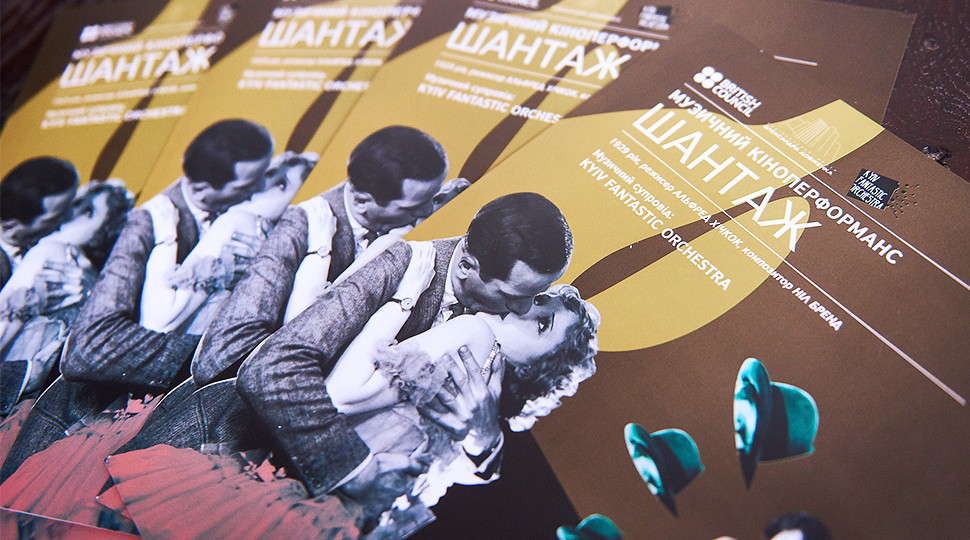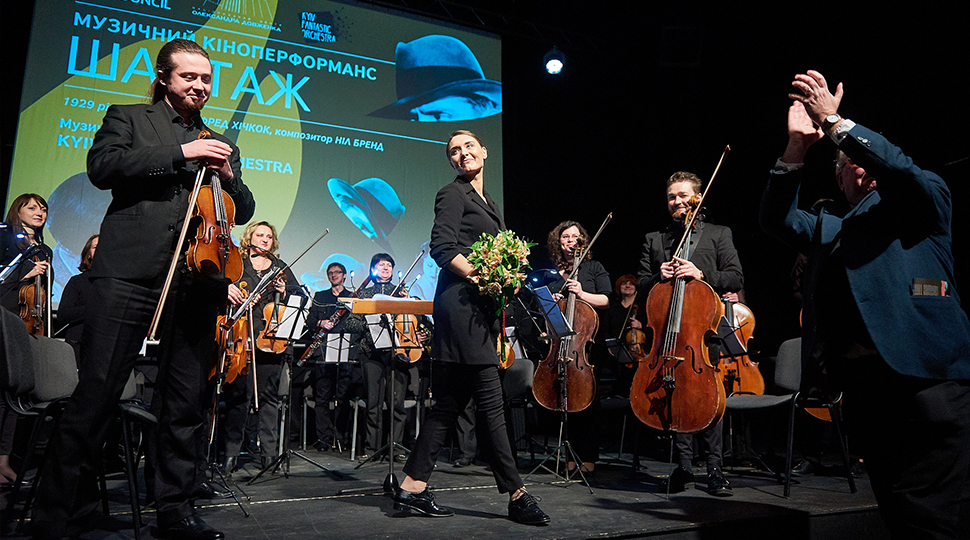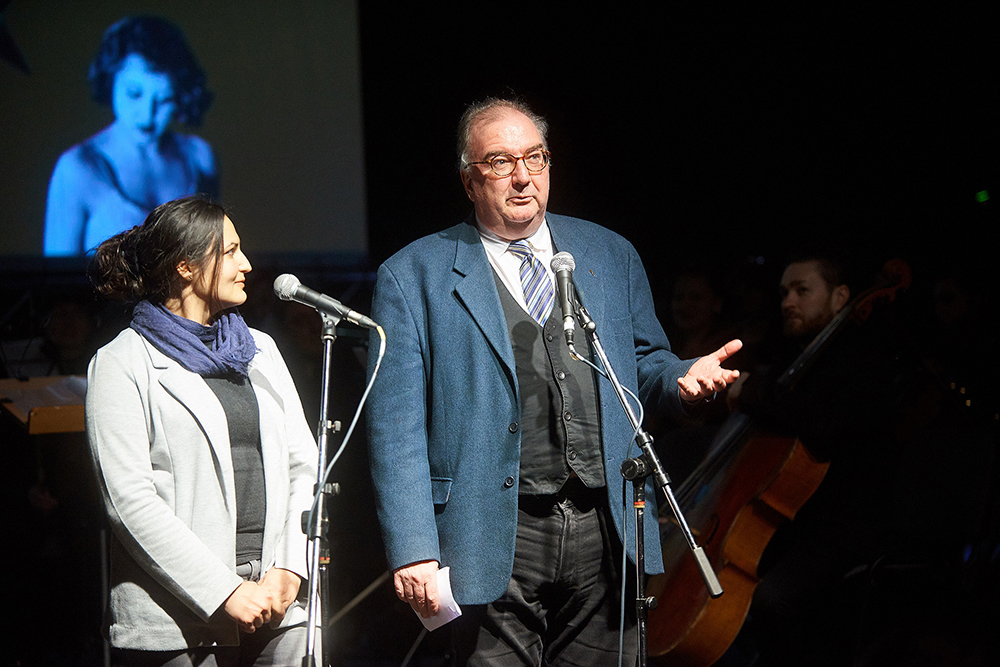- Show all
- Film and Music
- Composing for film with Neil Brand in Ukraine
Composing for film with Neil Brand in Ukraine

Composing for film with Neil Brand in Ukraine
We speak to composer and broadcaster Neil Brand about writing for film
Credit: Andriy MaximovEmerging film composers from Ukraine, Azerbaijan, Belarus, Georgia, Estonia and Kazakhstan gathered in Kyiv last month for Envision Sound, the second iteration of the British Council’s education programme for composers writing music for films and the moving image.
The British Council and the Oleksandr Dovzhenko National Centre in Ukraine joined forces to offer a week of workshops, networking opportunities and practical advice on the art of film composing led by expert mentors from the UK, Nainita Desai and Daniel Patrick Cohen. Participants were chosen based on the strength of applications they made in October 2018 and those that were successful were given some preparatory homework for the sessions in Kyiv. Working alongside the UK mentors they explored the near-endless possibilities of writing music for film with grants on offer to support the development of any particularly promising projects initiated during the programme.
Composer, dramatist, silent film accompanist and talented broadcaster Neil Brand closed the Thursday night’s programme with a public talk about the world of music and film today before presenting a live score performance of his music for Alfred Hitchcock’s 1929 film Blackmail. Performed impeccably by the Kyiv Fantastic Orchestra and conducted by Natalia Stets, the performance was made all the more remarkable by the fact Natalia was not following a monitor or using a click track to keep track of the film which is usually how modern live score performances work.
We caught up with Neil Brand back in the UK to ask him about his score for Blackmail, his work as an accompanist and broadcaster and get his tips for any composers interested in beginning or developing a career writing music for film.
One of the highlights of Envision Sound was the performance of your score to Hitchcock’s Blackmail by Kyiv Fantastic Orchestra. Can you tell us a bit about the work goes on behind the scenes to realise a live score performance such as this?
Neil Brand: I was taught all I know about scoring to picture and the problems of performing a live score by the great composer/conductor Timothy Brock, who is Musical Director to the Chaplin family, among many other accomplishments. Tim taught me how to time music to fit to picture, how to set metronome tempi that allowed the conductor to beat exact time and how to make musical changes as easy for an orchestra to follow as possible. Then, when I had written the score for Blackmail, I had to put every shot change (hundreds of them) into the score on the exact beat of the bar at which they happened, so that when Tim was conducting the orchestra he could see immediately if he was going too fast or too slow in comparison to the speed of the film. So when Natalia [Stets] got the score (I also sent her the film with the score in place so that she could see how the music synched with the picture) she had to do the same – beat time to keep the orchestra playing at exactly the right speed so that all the synch points, the doorbell, the telephone, the hand holding the glove, everything, had the right music under it. This meant that Natalya and the band had to be very exact, with the band following her beats exactly and watching her constantly.

Above: The Kyiv Fantastic Orchestra on stage, conducted by Nataliya Stets and applauded by composer Neil Brand. Photo: Andriy Maximov
You've made some fantastic documentaries about music, and film and music, over many years. Do you think there is growing public interest in film scores and do you see more composers moving into this area?
There is a huge public taste for film music, as evidenced by the number of “live score” showings these days in which the musical score for a complete feature film is played live. It’s because the public is often familiar with a film, especially if it’s a [James] Bond or a [Stephen] Spielberg film, and like to hear a good score well played. I guess it’s also because film music is made to sound impressive. The big sweeping Hollywood sound with strings and brass is most people’s idea of a film score and it’s sort of becoming the new concert music. Composers like working to a story (I certainly do) and thanks to the technology, a lot of the work can be done from a home set-up – TV now has the budget for big music scores and the money is also a draw for new composers!
When did your love of music really take off and how did your education at Aberystwyth University in Wales shape your development?
I had always been able to play the piano by ear and, although that gift was never really valued when I was growing up, it meant I could hear a piece of music, especially film or TV music, and go home and laboriously pick it out on the piano then impress my friends with the fact I could play a piece they all knew but nobody else could play! That gave me so much confidence and when I went to Aberystwyth, to study Drama, I found out about the subtext of storytelling, and had my first commissions to put music to the plays we were working on. I also got to use technology for the first time – multi-track recording machines, synthesisers and all the early paraphernalia of recording and producing digital sound. I came out of college a theatrical MD and wannabe composer.
Can you talk us through the mechanics of playing piano accompaniment for silent films? How well do you know the film before playing and how much is improvised on the night?
The best performances are the ones where I don’t see the film in advance but just sit down and start playing as the film begins – that way my responses to the film are instinctive and immediate and if the film is a masterpiece, you can hear my delight as an audience member coming out in the music. If the film is terrible, I don't know that until I’ve played it so I'm spared from playing it knowing it’s no good! But as the film plays, I am looking for all the things a film composer looks for: character, plot turning points, times when the music can open right up and others when it can settle back and be discreet. It is a completely different experience to scoring a silent film, which is why I never usually accompany a film that I have previously written a score for – if I’ve spent months with the movie composing a score for it, there’s nothing new to find in playing it live at the piano.
What’s your perspective on how technology has changed the world of music and film?
I couldn’t be a film composer if it wasn't for the technology. I couldn’t just “hear” the music in my head and write it down like the great concert hall composers did – I had to hear the instrument faked on a keyboard and learn the timbres and orchestral layers that I now use. So, thanks to technology, I “hear” every piece I write before it’s given to musicians to play and that is hugely helpful. Also, technology has allowed composers to invent their own sounds, ones never heard before – electronics and non-musical sound have opened up huge possibilities in the film and TV world. It is possible to create a unique sound with every new score just by blending and experimenting with waveforms and textures just as much as traditional musical sounds.

Above: Neil Brand on stage before the performance of his re-score to Hitchcock's Blackmail. Photo credit: Andriy Maximov
What are the key ingredients you think a great film score needs to have and what are a couple of your favourites?
A hook – that iconic musical phrase or motif which is both unforgettable and immediately redolent of some element of the movie like a character or a plot twist or geographical place that hearing that hook will immediately conjure up. Imagine the opening notes of Jaws or Harry Potter, the electronics at the top of Terminator or Blade Runner, the jazzy trumpet of so many L.A. Noir movies – the music does half the work of putting us deep in a situation before a single image has flickered onto the screen.
What advice would you give to someone aspiring to be a film composer today?
Watch as many films and listen to as many soundtracks as possible. Learn about the layers of drama in every scene. Read interviews with good film and TV composers to see how they go about getting under the skin of a movie. And above all, develop your own voice – don't try to sound like anybody else (even if that's what producers seem to want!) – find out what pleases you, the music that you enjoy writing, then when you have to score a moment in a drama, don’t just think “how would so-and-so do it?” but put yourself into the characters’ shoes. If a character is jealous, what does your jealousy sound like. If somebody’s in love, what does being in love sound like to you? That way, you are getting inside a drama as an actor would, growing your intuition and knowledge of human nature, and eventually we get a new film composer, not a clone of a thousand others.
Above: A snapshot of the inaugural Envision Sound in 2018 featuring Michael Price, the UK composer behind the music for the hugely successful TV series Sherlock starring Benedict Cumberbatch and Martin Freeman
Neil Brand
Neil Brand has been a silent film accompanist for over 30 years, regularly in London at the Barbican and BFI National Film Theatres, throughout the UK and at film festivals and special events around the world, including Australia, New Zealand, America, Israel, Sweden, Denmark, France, Germany, Ireland, Luxembourg, and, in Italy, the Bologna, Aosta, Bergamo and Pordenone festivals where he has inaugurated the School of Music and Image to teach up-and-coming young pianists about silent film accompaniment.
Training originally as an actor, he has made his name as a writer, performer, and composer, scoring BFI video releases of such films as South (Shackleton's journey to the South Pole), The Ring by Alfred Hitchcock and Piccadilly (premiered at the Lincoln Centre), and the great lost film The Life and Times of David Lloyd George.
Nainita Desai
Nainita Desai is a BAFTA Breakthrough Brit winner 2016-2017 and one of the UK’s leading composers having scored countless bespoke TV series and film scores for all the major broadcasters from the BBC to HBO to ITV and C4.
She is a recent winner of the Music+Sound Award for Best Feature Film Score, a Women in Sync Awards 2016 Nominee, RTS Craft Award 2014 Nominee for Best Original Music and RTS Scotland Awards 2014.
Nainita’s musical foundations are rooted in documentary where she has forged an enviable reputation, working with leading film makers on numerous projects that have garnered Oscar, BAFTA and Emmy awards and nominations. As a sound designer, Nainita’s career began on feature films for Bertolluci (Little Buddha) and Werner Herzog (Lessons of Darkness).
Daniel Patrick Cohen
Daniel Patrick Cohen is a British composer based in Romania with a range of musical interests, including film music, hip hop and electronic music.
Daniel first garnered international attention when he was among a handful of British composers invited to produce scores for Alfred Hitchcock’s silent films as part of the British Film Institute’s Hitchcock 9 project. His 90-minute score for Hitchcock’s first feature The Pleasure Garden has been performed around the world, including particularly special performances on Copacabana beach and at Transylvania International Film Festival.
In early 2015, Daniel released a concept album entitled The Passenger after the Michelangelo Antonioni film of the same name. An inspiration for the album was a quote from filmmaker David Lynch: on hearing Barry Adamson’s Oedipus Schmoedipus for the first time, Lynch reportedly described it as being ‘like hearing Hitch[cock]’s films in your head’. Daniel's other contemporary music includes Reciprocity, a song cycle developed from six poems by the Canadian poet Darya Farha commissioned by her sister Juliana.
As well as working to secure a proper legacy for the Pleasure Garden project, Daniel has three films with his soundtracks soon to be released. He is also working on a second album, and has the intention to produce more albums than there are Stanley Kubrick films.

